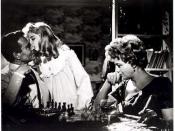Lolita is many things: comedy, tragedy, and a parody of both, but is it "the only convincing love story of our century"? Yes and no. Upon first reading, the author seems to imply a genuine love on Humbert's part, especially after his visit with the grown Lolita, but an in-depth analysis may prove that Nabokov was merely simulating the entire narrative in order to live up to the reader's expectations of a dynamic character.
An early indication of the connection Humbert feels with Lolita is his doomed childhood relationship with Annabel, whom he refers to once as his "dead bride" (Nabokov 39). He seems to be telling the reader that because he could not consummate their bond, he is fated to fall for Lolita. Humbert says "there may have been no Lolita at all had I not loved, one summer, a certain initial girl-child." (Nabokov 9). It's a mathematical equation: If Humbert's love for Annabel is real, and Lolita is the reincarnation of Annabel, then Humbert must truly love Lolita.
When Humbert first sees Lolita, he compares Lolita to Annabel, saying "It was the same child-the same frail, honey-hued shoulders, the same silky supple bare back, the same chestnut head of hair." (Nabokov 39).
Throughout the novel, Humbert describes Lolita physical characteristics with great care and precision; it is evident that he has a tremendous amount of affection for her. He describes Lolita in very specific terms, "soot-black lashes of her pale-gray vacant eyes...five asymmetrical freckles of her bobbed nose...blond down of her brown limbs." (Nabokov 44). Could this be a device used to lure the reader into the "love story" aspect of the novel: If Lolita is as beautiful as Humbert makes her seem, than how could the reader wish them to be apart from...


